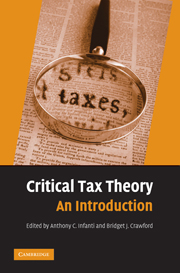Book contents
- Frontmatter
- Contents
- List of Illustrations
- List of Tables
- List of Contributors
- List of Common Abbreviations
- Introduction
- CHAPTER 1 FOUNDATIONS OF CRITICAL TAX THEORY
- CHAPTER 2 HISTORICAL PERSPECTIVES ON TAXATION
- CHAPTER 3 THE GOALS OF TAX POLICY
- Racial Equality in the Twenty-First Century: What's Tax Policy Got to Do with It?
- Discursive Deficits: A Feminist Perspective on the Power of Technical Knowledge in Fiscal Law and Policy
- The Hidden Costs of the Progressivity Debate
- Tax Equity
- Tax Policy and Feminism: Competing Goals and Institutional Choices
- CHAPTER 4 CRITICAL TAX THEORY MEETS PRACTICE
- CHAPTER 5 RACE AND TAXATION
- CHAPTER 6 GENDER AND TAXATION
- CHAPTER 7 SEXUAL ORIENTATION AND TAXATION
- CHAPTER 8 THE FAMILY AND TAXATION
- CHAPTER 9 CLASS AND TAXATION
- CHAPTER 10 DISABILITY AND TAXATION
- CHAPTER 11 GLOBAL CRITICAL PERSPECTIVES ON TAXATION
- CHAPTER 12 CRITICAL PERSPECTIVES ON CRITICAL TAX THEORY
- Index
The Hidden Costs of the Progressivity Debate
Published online by Cambridge University Press: 04 August 2010
- Frontmatter
- Contents
- List of Illustrations
- List of Tables
- List of Contributors
- List of Common Abbreviations
- Introduction
- CHAPTER 1 FOUNDATIONS OF CRITICAL TAX THEORY
- CHAPTER 2 HISTORICAL PERSPECTIVES ON TAXATION
- CHAPTER 3 THE GOALS OF TAX POLICY
- Racial Equality in the Twenty-First Century: What's Tax Policy Got to Do with It?
- Discursive Deficits: A Feminist Perspective on the Power of Technical Knowledge in Fiscal Law and Policy
- The Hidden Costs of the Progressivity Debate
- Tax Equity
- Tax Policy and Feminism: Competing Goals and Institutional Choices
- CHAPTER 4 CRITICAL TAX THEORY MEETS PRACTICE
- CHAPTER 5 RACE AND TAXATION
- CHAPTER 6 GENDER AND TAXATION
- CHAPTER 7 SEXUAL ORIENTATION AND TAXATION
- CHAPTER 8 THE FAMILY AND TAXATION
- CHAPTER 9 CLASS AND TAXATION
- CHAPTER 10 DISABILITY AND TAXATION
- CHAPTER 11 GLOBAL CRITICAL PERSPECTIVES ON TAXATION
- CHAPTER 12 CRITICAL PERSPECTIVES ON CRITICAL TAX THEORY
- Index
Summary
Progressive taxation – taxing high-income individuals at a proportionally higher level than low-income individuals – has sparked more than a century of controversy. Those who support progressive taxation have heralded it as a policy that promotes the greatest good for the greatest number in society, protects traditional democratic values, reflects the communitarian worldview of women who see themselves as responsible for the well-being of all individuals, and reveals the “aesthetic judgment” that income inequality is “distinctly evil or unlovely.” At the same time, critics have condemned progressive income taxation as social policy that amounts to theft and involuntary servitude, reflects the democratic process gone awry, penalizes hardworking individuals, and produces economic waste throughout society. Theorists in almost every discipline have entered the progressivity debate, proposing a variety of different tax rates in order to disburse the costs of public goods and services.
Despite their contending viewpoints, theorists on both sides of the debate have reached surprising consensus on the proper treatment of the truly poor. Both sides agree that legislators and policy makers must avoid imposing tax costs on individuals living at or below subsistence levels of income. This agreement is notable in light of the widespread perception that advocates of progressivity worry about the poor while its detractors worry about the wealthy.
In fact, all tax theorists have divided society into two groups – relatively wealthy individuals who pay taxes and poor individuals who are excluded from the face of the laws entirely.
- Type
- Chapter
- Information
- Critical Tax TheoryAn Introduction, pp. 53 - 59Publisher: Cambridge University PressPrint publication year: 2009



